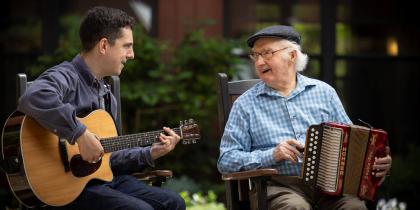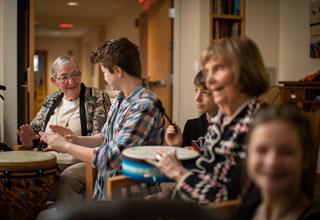The Healing Power of Music for Older Adults
Learn how music can offer health benefits and enrich every chapter of older adulthood.

“When we are feeling upset, try to think positively. Try a little harder to move forward, because life has challenges, but it’s worth it.”
Those are the lyrics to a song that a music therapy group at NewBridge on Charles in Dedham, MA, wrote during a session facilitated by Alexandra Spyropoulou, a music therapist at NewBridge and Hebrew Rehabilitation Center in Boston. When a memory care assisted living resident was angry and upset about something that had happened that day, the group spent the entire session unpacking those negative feelings and discussing how to reframe them. The result was that song about those feelings, completed with its own melody.
Music is powerful. Research has demonstrated that music therapy can improve sleep quality in older adults, that music-making positively affects cognitive functioning for adults with mild cognitive impairment or dementia, and that older adults who listen to a lot of music have higher life engagement and better health than non-music listeners. Music can also be an effective complementary approach to relieve chronic pain in medical settings.
Music has a significant presence across all of Hebrew SeniorLife’s communities. From resident ensembles and choruses to partnerships with local performance groups, volunteers who bring their musical talents to us, and music therapy, music touches the lives of many of our residents and patients. Here are just some of the ways how.
Music is a family tradition spanning generations
As a child, Mary Tess was only allowed to skip school one day each year: the day the Metropolitan Opera made its annual tour stop in her hometown of St. Louis. Now an assisted living resident at NewBridge, Mary remembers those special days fondly. She credits her lifelong love for grand opera to her father.
“I was from a musical family, and my parents were crazy about grand opera. My dad played grand opera every minute he was home, so we grew up loving it,” she says.
Involved in church choirs from the age of four, music has been an important part of Mary’s life for as long as she can remember. She has played multiple instruments, including the piano, guitar, and ukulele. Her a cappella trio was invited to sing on the radio in St. Louis when she was in high school.
Just like her father passed on his love of music to her, her children and grandchildren have developed their own passion for music. Her granddaughter just finished starring as Belle in a production of Beauty and the Beast.
At NewBridge, Mary has embraced opportunities to be involved in music. For starters, she is part of the independent living choir. The assisted living community has its own choir, but after trying both, she found the independent living choir was a better fit and was welcomed with open arms — anyone can join! “I thought it was probably going to be ordinary. It is not ordinary. This is one of the best choirs, and the choir director is one of the best I’ve ever had,” she explains.
She also participates in weekly music therapy group sessions in the assisted living community. “He’ll either show an opera on the screen or play the guitar, and we sing along, make requests, and do things like that. I wouldn’t miss it. A lot of people love it,” she adds.
Music promotes intergenerational discussion
At Center Communities of Brookline, Hebrew SeniorLife volunteer Lexine Feng facilitated a music discussion group that included residents and local high school students. She created the group for her capstone project as a cello major at the New England Conservatory, hoping to explore how music can fit into intergenerational spaces. She believes music is “a powerful tool that can build bridges between people across generations.”
Lexine played solo cello pieces by Johann Sebastian Bach and Gaspar Cassadó — she has been playing cello for over 15 years — then prompted attendees with questions such as, “Does this piece remind you of any images or memories you have?”
“The older adults came up with nature-related imagery. They related it to how animals would move, how a tree might move in the wind, or how water would flow. There was an interesting contrast to what the high school students said, which is that the music reminded them of certain scenes in movies,” she explains.
The feedback she received from participants was overwhelmingly positive. “One resident told me that music is an important part of life and that the program is a good reminder of why we need to continue engaging, listening, and having conversations around music. One person said music is the most important part of life,” she adds.
Music fosters resilience and empowerment
The lyrics at the beginning of this blog post underscore how songwriting can help people process their emotions and foster resilience.
“Songwriting serves as a powerful tool for psychosocial support, allowing individuals to reframe negative thoughts into positive ones,” says Alexandra, the music therapist. “Songwriting can address various goals, building a sense of community and allowing everybody to share their ideas and feelings. We’re working on a goal: to write a song all together,” she adds.
Songwriting can foster a sense of autonomy because of the decision-making involved, which can empower older adults who feel a loss of independence due to aging-related challenges. In another example, a Hebrew Rehabilitation Center patient came to Alexandra in a lot of pain. During that music therapy session, the group worked together to write a song, which helped distract her from the pain but also helped the group develop resilience and coping strategies, create a feeling of success, and have fun!
One more song that has come from a music therapy session has stuck with Alexandra because of its message of strength and resiliency, particularly as the world is going through challenging times:
“We find rest in optimism. We pray, and we stay strong. This is the key to being hopeful. This is how we keep faith.”
Music brings memories to the surface
Christopher Maier is a music therapist at NewBridge’s assisted living community. While listening to and performing music has many benefits on its own, music therapy is distinct because you’re processing music with a board-certified music therapist.
“Music therapists will have a non-musical goal in mind during sessions. It’s not just to entertain them but to improve their well-being in a variety of ways. Of course, we want to improve the moods of group members, but we’re really aiming to involve them through active participation. Group singing has been shown to increase feelings of community and belonging, and we try to utilize every opportunity for members to socialize through reflection, reminiscing, and lyric discussion,” says Christopher.
Other examples of non-musical goals include empowering individuals and boosting self-esteem, as well as decreasing anxiety and increasing relaxation. “We often want to engage members cognitively and stimulate their minds, as music-making and active listening can be such powerful tools for benefiting our brain health. Music can also be an effective motivator for movement, so we also use it for that advantage, providing a fun way to exercise our bodies through dancing, instrument playing, and stretching,” he adds.
Christopher thinks of music as a bookmark. “If somebody has a personal connection to a song, it’s almost like a chapter of their life, and it can bring them back to that — whether it be childhood, young adulthood, or marriage,” he explains.
Have you ever heard a song and been transported back to a moment, day, or time of your life? That’s exactly what he’s referring to! If you hadn’t heard that song, that memory wouldn’t have come back. The same phenomenon has happened in his music therapy groups, with the bonus of the group connection.
“We might play a song for them, and then someone will say, ‘I had that song at my wedding,’ then they talk about wearing their wedding dress and what it felt like and their parties. There’s a momentum to that,” he says.
Music leads to remarkable moments
Sang Lam is a classical pianist and emergency room technician who volunteers at Hebrew Rehabilitation Center at NewBridge on the Charles. His deep belief in the value of music in geriatric health care settings recently inspired him to found a program called MediNotes. Through MediNotes, he aims to recruit students who love music — particularly those interested in pursuing medicine careers — to volunteer to bring music to long-term care facilities in Central Massachusetts and Greater Boston.
In just a few months as a Hebrew SeniorLife volunteer, Sang has been struck by what music is capable of. “One patient’s favorite song was ‘Somewhere Over the Rainbow.’ So I went home, practiced the song, came back, and I played that piece. And she had tears in her eyes as she sang along with the chorus. Music can bring back core memories that people have lost, and it was so amazing to see something I have read about in books, papers, and literature. That was my first time seeing that happen,” he says.
You can watch a video of Sang performing at Hebrew Rehabilitation Center here to see what he offers our patients.
Music gives late-stage dementia patients an outlet for self-expression
Alexandra also works with patients who have late-stage dementia at Hebrew Rehabilitation Center. Music therapy is still goal-oriented for these patients, but the goals shift. In group settings, one-on-one interactions between patients and therapists become even more crucial. With patients who have late-stage dementia, she often focuses on sensory stimulation, postural improvement, and brightening affect.
She describes one patient who is nonverbal and usually has her eyes closed and head down. “I used a lot of singing and therapeutic touch, and the outcomes were truly heartwarming. She was able to make eye contact and also opened up her posture. While we held hands, she gently moved her hands to the rhythm. I couldn't believe it,” she says.
There are moments when the patient can hold and play the maraca for a few seconds. “She cannot use words, so she’s able to communicate through instrument playing, into something that gives her joy and is meaningful for her,” she adds.
According to Christopher, music can offer an alternative to self-expression when speech is compromised, which can happen to people with dementia. “Music uses the whole brain. If it can’t go one way, it’ll find another way. Music is so powerful like that,” he says.
Hebrew SeniorLife helps you tune into music at any level of care
The value of music for older adults isn’t lost on Hebrew SeniorLife. That’s why you can find resident ensembles and choruses, regular music performances and programming, immensely gifted music volunteers, and passionate music therapists in our locations across Greater Boston. Whether you’re considering moving into an independent living or assisted living community and want to ensure you’re not the only music lover or are looking into long-term chronic care facilities and prefer an arts-focused touch, our expansive music offerings have you covered.
Find a service or community online to learn more.
Blog Topics
Learn More
Expressive Art Therapies
Using music, dance, and art, our expressive art therapists provide psycho-social support to seniors experiencing a wide range of issues, including adjustment to aging, health status changes, depression, and anxiety.
Intergenerational Programs
Operating across Hebrew SeniorLife communities, our multigenerational programming is designed to support the needs of old and young alike.





